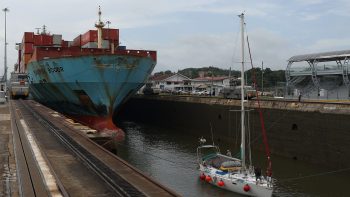More people retiring abroad
TEXT OF STORY
Tess Vigeland: The United States has lost a cumulative $2.8 trillion of retirement savings in the downturn. While some retirees are scratching their heads, others are picking up their passports. Mexico and Costa Rica are popular, but there’s a new “it” place: Panama, where last year, despite all of the global turmoil, the economy still grew nine percent. Reporter Karen Weise went to Panama, where she met a retired parole officer from Detroit.
Karen Weise: I met 60-year-old Carl Haskins at an expat party in Panama City. There were two things I couldn’t miss about him — his bright Panama Canal baseball cap, and his huge smile.
Carl Haskins: Here I am. I love it too. Wow. Oh man. This place is wonderful. The people, the people make the country.
Carl moved from Detroit to Florida in 2002 after his wife died. But there, he started feeling squeezed.
Haskins: I saw that my income, or my ability to pay for different things, was diminishing each year. And I said, well, at this rate, I’m going to be in trouble in five years.
Carl’s one of thousands of American retirees who chose to move south. He visited Panama twice. He says you always need to do things twice. In the end, Carl chose to live in David, a city near the Costa Rican border.
Haskins: As a matter of fact, I moved up country. I’m not in the city. And God I love it even more. It’s everything I ever wanted. I get to see cows and horses like when I was a kid.
Carl said back in Florida, he paid $1,400 a month for rent. In David, he pays less than a quarter of that for a two bedroom apartment that’s fully furnished. TV, sofa, bed, everything.
Haskins: Holy mackerel! And that’s $300 a month. I say give it to me! Hurry up!
Though Carl is renting for now, many expats are laying down permanent roots. Some even build their own homes, often coming in around $60 to $70 a square foot. Though, they warn, it takes patience. As several people told me, you’ve got to get used to “manana.”
Mario Vilar is a go-to guy for beating back the bureaucracy in Panama. His company, called Move to Panama, helps with filling out visa applications, bringing pets into the country, finding real estate.
Mario says the tanking U.S. economy has slowed down the flow a bit.
Mario Vilar: Many people that are planning to move to Panama, they are ready to do it but they cannot do it or are just waiting to sell their houses. That is the biggest delay, selling their houses.
Mario says people might come a few months later, but they’re still coming. In part, that’s because the government kicks in some sweet incentives. New construction is exempt from property taxes for 20 years. And retiring expats can live on a visa that gives them the same perks as local retirees, with discounts on everything from movies to utility bills.
But this growth comes at a cost. Farmland is being plowed under for gated communities. And most Panamanians cannot buy homes, let alone groceries, in popular expat areas. And, let’s be clear, retiring in Panama is not like retiring in the U.S. It’s chaotic, like you’d expect to see in a country growing so quickly. Unpaved roads. Sporadic trash collection. And illogical bureaucracies.
Bob Adams: You look into your own heart, so to speak, before you move down, and ask yourself how flexible am I, because you are going to have to adapt to a different culture.
Bob Adams threw the party where I met Carl, from Detroit. Bob runs the website RetirementWave.com. He says baby boomers retiring now find living in Phoenix or Boca to be a bit, well, boring.
Adams: They’re not their parents, and they’re not just expecting to settle down and die a few years later or something of that sort.
Weise: And what about being far from family?
Adams: Their attitude is if we don’t get over to the grandchildren this month, we will the next time. It’s a whole different mindset.
Panama has high speed internet, so everyone emails, Skypes, and video chats with their families. And Carl, from Detroit, he said he now has disposable income that he never would’ve had if he stayed in Florida.
Haskins: (So) As far as costs, there’s no way I can beat this, and plus, it gives me the opportunity, this will be my third trip home in six months. It just gives me a sense of ability that I had before. And I can go forward, and I can still be a help, rather than a burden to my children.
Carl hopes to buy a place in the next few years and sees it as a family retreat of sorts. He wants his grand kids to visit and experience life in the countryside, just like he had as a kid in rural Michigan, a half century ago.
This is Karen Weise for Marketplace Money.
There’s a lot happening in the world. Through it all, Marketplace is here for you.
You rely on Marketplace to break down the world’s events and tell you how it affects you in a fact-based, approachable way. We rely on your financial support to keep making that possible.
Your donation today powers the independent journalism that you rely on. For just $5/month, you can help sustain Marketplace so we can keep reporting on the things that matter to you.


















